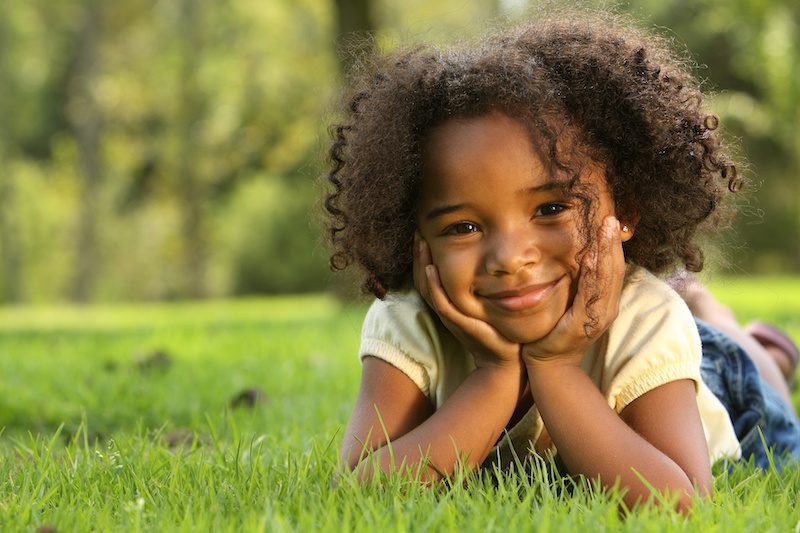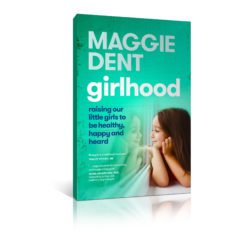Newsletter Articles, Posts for Parents, Raising Girls
The wonder of little girls’ memories

While I was busy researching for my book about young girls, Girlhood: raising our little girls to be healthy, happy and heard, I found myself wandering around my own childhood. When I was exploring the chapter ‘celebrating their wonderful memory’ I vividly recalled experiences – some from as young as four years of age.
Given that we are shaped by the earliest experiences we have, how we perceive them to be, how we remember them and how they made us feel, it makes sense that who we become as adults has so much to do with our memories. I can still remember being bitterly disappointed the Christmas before I started big school (so I would have been five years of age), when my main present was a new school bag. When I recall this memory, I actually feel the sensation in my body that was very similar to what I recall I had felt as a girl. How fascinating is that?
My granddaughters and their ability to remember things have completely blown me away so many times that I decided to explore if that was what was happening with other little girls. Research and anecdotally we know little boys tend to forget things; even one of my brightest most confident lads came to me when he was eight and asked where the socks were? Given that I had had the same sock drawer for his whole life, I suggested he might go and look in there!
In researching the book, I conducted an online survey of almost 5,000 parents and educators, and the wonder of little girls’ memories was obviously a real thing. Around 2,900 responses selected little girls memories as being something that amazed them about their girls. Given that anatomically there is very little difference between girls’ and boys’ brains, the perceived superiority of girls’ memory was a little difficult to prove scientifically.
Some studies show that females tend to outperform males on autobiographical memory, especially when the recall happens verbally! They also tend to perform better on random word recall, story recall (especially auditory), episodic memory, semantic memory and face recognition tasks. I found it a little amusing that other studies demonstrate female superiority in object location memory tasks! It seems that females do have a tendency to be able to find things better than males however there is one big exception – males can find objects they consider objects to be extremely important quite efficiently.
However, it seems that our memories are not totally accurate and that our brain is nothing like a filing cabinet.
Memories are not fixed either and every time you retrieve a memory you are actually altering the memory in some way because memories have to do with associations. This makes sense of why siblings can have very different versions of exactly the same event that may have happened in their childhood.
The link between memory and emotion
Our memories tend also be anchored more strongly when there is a heightened state of emotion – either positive or negative. That makes sense of why I still remember that Christmas and that school bag!
Given that our girls tend to have a heightened emotional intensity and that they can take much longer to process and make sense of their big emotions, this may be a contributing factor in why they can remember things so well.
There have been so many moments that my little granddaughters have remembered vividly that have really surprised me. I have noticed they have a tendency to remind me of painful experiences rather than positive experiences and there is some research that validates that this can be a tendency for females in general. There is some research that suggests that ruminating over negative things occurs more often in females than males and this can be a contributor towards the challenge of getting stuck in moods for our girls. One study showed there were significant differences between genders in brain connectivity during negative emotion processing and that the males in the study tended to have a more evaluative response to negative emotion processing while the females tended to have higher affective, emotional response. However on further exploration I found the sample size in this study was too small to be significant, so it is more food for thought than evidence
When I noticed how efficient my little granddaughters’ memories were, I invited them to help me remember things better and wow – they sure did. So I suggested to one of my sons to ask for his 3 ½ year old daughter’s help to remember things and he too was pretty surprised at how efficient she was. If he suggested they needed to get some more milk or bread or fruit when they went shopping, she never forgot those things. What he also came to notice was that she began to see things that needed doing without a grown-up’s input. From time to time she reminds daddy to check how much fuel he has and so often he finds he is in need of topping up that tank. Do encourage your little girls to help you remember stuff because not only will they do that efficiently, it helps them feel more included, valued and appreciated. They may surprise you.
Remember, they’re watching you…
According to social learning theory, children are biologically wired to learn through watching the behaviour of other humans. This is partly due to the magic of the mirror neurons in your brain. Our little girls are watching us all very carefully and yes they can remember the things we do and the things we say very accurately. If you listen to when little girls use swear words they are contextually correct with the appropriate tone! (Remember that ‘there’s a f***ing goat outside’ video that went viral?).
As one mum who responded to the survey wrote:
My three-year-old reminded me tonight how much they mimic us.
I lost my cool for two seconds while trying to get her out of the shower with a screaming newborn.
She whipped the curtain open, grabbed my hand and said, ‘Mummy, take a breath.’ I did so.
She looked me in the eye and said, ‘Feel better now?
It’s okay to have big feelings but remember we don’t use our loud voices at each other when we are upset.
Just breathe, dude!’
While we are unable to protect our little girls from the unpleasant realities of life, we can consciously choose to build happy and positive memories. From family rituals around birthdays, holidays, graduations and reunions to the simple ones that can happen in day-to-day family life. Family movies, pancake breakfasts and regular walks with the dog, trips to the park or the beach, are all shaping our children’s minds for the future.
I have so many fabulous memories from my childhood of picking mushrooms, mulberry fights, endless bike riding all over the farm, building cubbies, feeding pet lambs, swimming in the river with my cousins and having bush barbecues.
Dr Lisa Feldman Barrett in her book How Emotions are Made argues that in the early years of life our brain is busy predicting and that our emotional experiences shape how we will manage our emotions later in life. This is one of the reasons why I believe we need to engage in emotional coaching with our girls when they are little so that they can grow up with a healthier understanding of all emotions.
The combination of having brilliant memories and emotional intensity can have a downside.
Things that impact us negatively and painfully as little girls, from the things people say to us and unpleasant experiences we have can trigger strong emotions in us as adult women. When I read the beautiful foreword for my book written by Tracey Spicer, a wise and intelligent woman who I have admired for a long time I experienced a visceral reaction in my body which I wasn’t expecting. I have always coped with strong negative emotions by going for a walk and I took myself off for a very long walk to work out what was happening in my body. Then I remembered…
One day after doing a confident presentation at an assembly, an older man came up to me and spoke in a very patronising way – he told me that I needed to be careful that I did not get too big for my boots. The sense of fear and shame that he evoked in me at that moment, had come crashing back into my body because Tracey’s words had been complimentary. That moment was set deep in my mind and I have struggled so often with imposter syndrome (and I know many other women have as well). In a way, once I had made sense of my reaction, it validated the need to write this book so that we make sure our little girls are not given similar limiting messages.
When we encourage our preschool girls to love and accept themselves rather than endlessly feel they are in competition with all other girls, or worse still that their appearance defines who they are, we can change their lives forever.
It’s absolutely okay to celebrate our successes with joy not with an abiding sense of dread that we might be ‘too much’.
While science doesn’t have any absolutes as to why our little girls can have such fantastic memories, let’s just celebrate the fact that generally they do and let them use these wonderful memories to help us sometimes forgetful parents and grandparents to remember stuff.
Image Credit: ©️ by SUDIO 1ONE / Adobe Stock
Maggie’s new book, Girlhood: Raising Our Little Girls to be Healthy, Happy and Heard is out now. Order on ebook, audiobook or in print. Get all the details here.
You might also be interested in catching the replays of her masterclasses with Steve Biddulph on Raising Mighty Girls, or her masterclass about tween/teen girls with Michelle Mitchell, Understanding Our Gorgeous, Confused Girls.
©️ By SUDIO 1ONE /Adobe Stock – stock.adobe.com




